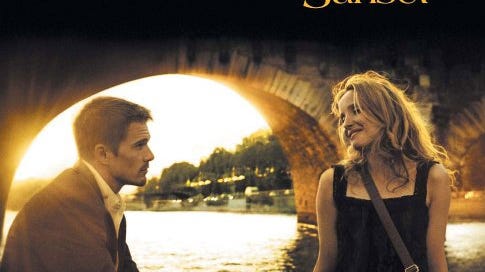Dear Dahling,
We need to talk about Ethan Hawke and we need to do it fast.
Here’s what we need to figure out: How did Ethan Hawke get so…known?
Today, I was thinking about something the novelist Jonathan Franzen said once, when I heard him speak at the Free Library of Philadelphia. He was promoting a book called Freedom, which was rather good though I can’t remember it too much, and he was answering an audience question about achieving fame and success. He said that as an artist, his excitement is having a story to tell, not the finished product and the touring and the marketing and the talking-about.
This point of his was the thing that stuck with me most from that night. The true artist likes the doing, the creation itself, the fascination with the process, and is not in it for the fame and fortune and positive reception and plane tickets and fancy dinners. It is about the work, and the vibration of that work. The deep soil from which beauty and truth blooms. And often artists are weird, because it is in the weirdness and wilderness and isolation that they are able to watch and create and reveal and portray something unique and relevant. There is a reason that many of the most well-known artists were not revered or respected in their own lifetimes. They create and did create from, what the poet Rilke says, necessity. They can’t not create. Because they see things where others are blind.
And so, what Ethan Hawke has is this doing energy, this ability to see, and an inner gristle that gives him an edge, even as he looks a little like the infamous Bluebeard on the outside.
I have attempted to fashion a way of understanding Ethan Hawke and why I keep watching his movies. Because if he was not a “well-known actor,” and just a guy working in my town, and he walked into a cafe I was sitting in one morning, I’d probably look the other way and think, “greaseball,” or something. (I’m really not this judgmental, we’re just trying out this scenario, dahling.)
But here’s what makes Ethan Hawke “Ethan Hawke,” and the actor and artist that he is—which is so human, real, and alive:
He would notice me there and he’d give some shy smile, and he’d take cash out of his back-pocket because of course Ethan would prefer cash to buy his coffee. He’s old school and he’s painting a house or something, and the homeowners give him cash. And he’d get just a classic cup, nothing fancy, and talk to the barista about the song on the stereo. Then he’d find some stained glass in a window no one else saw and he’d ask who made it and how it got there. And then the barista would tell him the story about the owner of the cafe, who has a side hobby of blowing glass and making stained glass in an empty shed, and that he has a whole wall full of the glass art he makes. Ethan Hawke would be so interested in this and the barista would give Ethan the guy’s number so that Ethan can go over and see it for himself.
That’s the kind of stuff that happens to Ethan Hawke. He is a person who manifests these kinds of moments.
Life in art, art in life.
He knows how to see, and so then, he can be seen.
It is Ethan Hawke in Richard Linklater’s “Before” Trilogy that opened me up to him as an actor. The three movies writer/director Richard Linklater put together, nine years apart, with the same two actors, in different cities, are Before Sunrise, Before Sunset, and Before Midnight.
Before Sunset is my favorite of the three. In this second volume of the trilogy, Jesse is married and unhappy, but doesn’t want to miss out on his kid’s childhood, and here he is in Paris with a beautiful woman who inspired so much art in him, and who didn’t show up for him years ago when they were supposed to reconnect. But, if she had shown up, he wouldn’t have written this novel, and he wouldn’t have had this amazing kid. Still, he wants touch, and love, and mysticism. So Jesse sits with Celine in openness and beauty and possibility in this most romantic, feminine, and magical of cities—Paris—and he debates whether or not he should go home.
There are reasons people don’t want to leave Paris. It just is what it is.
Here is a man who has seen all sides of the coins and the diamonds, has ventured into all parts of his inner castle, and now he has a decision to make. Why does it seem he has to choose one love or the other? Meanwhile, the golden hue of the sun is radiating everywhere, in all the scenes, like the vast fabric of his heart.
The film is about people, and it is about dusk. The way dusk invites something, forms a bridge between masculine power and feminine innocence, and in that space is the lingering purr of a cat, and the voices of workers coming home to get an apertif, and the closing down of the boats on the river so people can get to the market to plan their dinner. It is about dancing to the jazz piano of Nina Simone when some fresh air blows in. In the magic of dusk, and also in this film, is the quiet question: What is next?
There are no endings and beginnings. There is just the bridge. The life. The river that awaits the moon and moves, flows, glistens. Soft, gentle, quiet. Like a leading man.
I love dusk and this movie.
Watch it, honey!
Yours truly,
Ms. Wonderful




